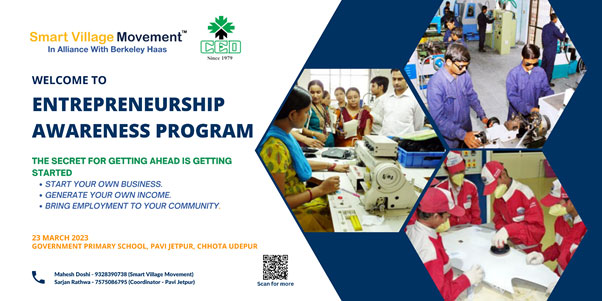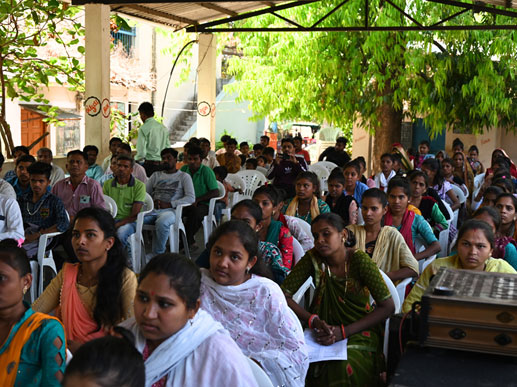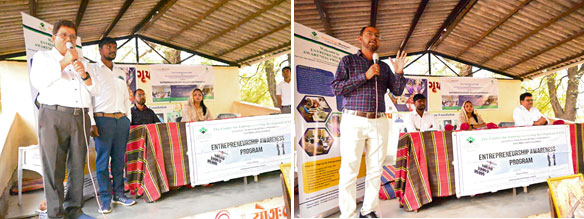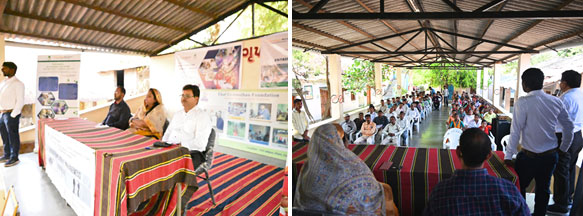The Challenge:
Low literacy, high dropout rates from schools, malnutrition, and poverty still remain a challenge to some of India’s tribal and rural populations. Rural and opulations are largely dependent on collective land and forests for their livelihood, making their way of life rather unique. However, due to a lack of accessibility, opportunities, and development, the standard of living among tribal groups remains poor.
Statistics reveal that though the literacy rate of the Scheduled Tribes (ST or Adivasis) population in Gujarat has constantly increased for the last five decades, the ground reality and actual data point toward massive unemployment in the community. The major problems of the tribes in north Gujarat (Vadodara, Dahod, Panchmahal, Sabarkantha, and Banaskantha) are lower levels of literacy, high incidences of sickle cell anemia, unemployment, and a high degree of migration.
Lack of Employment and Livelihood Opportunities:
Tribal development has remained centralized and largely government-dependent. Due to the absence of employment opportunities, educated tribal youth are either forced to work as daily wagers in unorganized sectors or migrate for better options. Since employment opportunities in industrial houses are not available to even educated tribal youth due to a lack of skills or entrepreneurship development, agriculture and dairy farming remain their main economic activity.
Entrepreneurship Awareness Program (EAP) organized in Chhota Udepur, Gujarat by SVM and CED
The Smart Village Movement, in collaboration with the Centre for Entrepreneurship Development (CED) and the , organized an Entrepreneurship Awareness Program (EAP) on March 23, 2023, in the Pavi Jetpur Taluka of Chhota Udepur, Gujarat. The purpose of the program was to raise awareness and encourage rural youth, especially women, to consider entrepreneurship and help them explore different business opportunities.
The program was attended by approximately 100 people, with women representing 55% of the attendees. Mr. Ashish Shah, Regional Officer of CED-Vadodara, provided valuable guidance and information to the audience. The topics covered included:
- Which business to start
- How to start
- Available business and industrial opportunities
- What is Project Report,
- State Government Schemes,
- Availability of bank loans and other financial assistance,
- Management of business start-up
- Accounting,
- Marketing,
- Importance of skill development and training
The program was well-received, and it generated much interest among the audience regarding entrepreneurship and skill development training. More than 25 percent of participants expressed their interest in joining a two-week rigorous training program to be organized by SVM and CED. One of the participants who leads a group of more than 50 women would start a self-help group to start a business activity after getting trained by the CED Program for Entrepreneurship.
An Inspiring Story of a Young and Enthusiastic Sarpanch:
The Sarpanch of Dungarwant village Dr (Smt.) Binaben Rathwa attended the event and committed support for SVM’s future development projects and pilots.
Dr. Rathwa gave a very inspirational speech about women’s empowerment sharing her own story. When she married, she had only graduated 12th grade but was determined to study further. She took up the challenge and started higher studies. She endured many struggles for six years of a daily 260 km commute from Pavi Jetpur to Vallabh-Vidyanagar to attend college to complete her higher education. Today, she holds double graduate and post-graduate degrees and a doctorate in philosophy. A mother of a six-year-old daughter, she has plunged into active politics intending to serve the community.
Entrepreneurship Brings Economic Growth to a Community:
The EAP is part of the efforts made by SVM to promote entrepreneurship development and skill training in the Chhota Udepur district. The program aims to provide farming and non-farming employment and business opportunities to the tribal population. The program’s success in generating interest and curiosity among the audience may lead to more entrepreneurship opportunities and economic growth in the region.
ABOUT SMART VILLAGE MOVEMENT: The Smart Village Movement is a collaborative process facilitated by the SVM organization with the Berkeley-Haas Center of Growth Markets to create a Smart Village ecosystem. We partner with Government, Academia, Corporations, and Rural Communities to foster independence and sustainable rural development in Indian villages and other emerging markets. Our mission is to empower rural people through digital technologies and open innovation platforms to access global markets.





